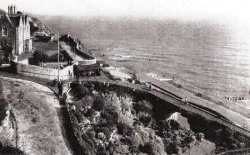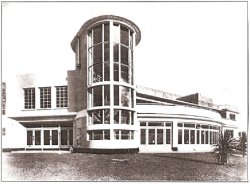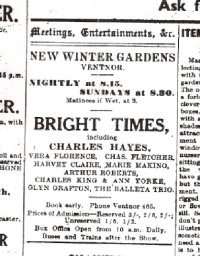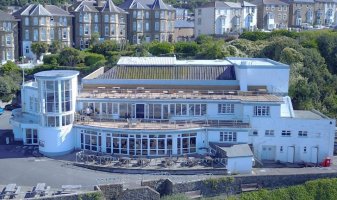The beginning...
The Winter Gardens stands where Ventnor Parsonage used to be. The large stone Victorian Parsonage, built for the Vicar of St. Catherine’s Church stood in spacious gardens for almost a century. The Parsonage was purchased by Ventnor Urban District Council in 1929 for £3,801 and was initially refurbished for public use. The ground floor rooms were converted for reading, games and music, and the upper floors as a refreshment area, while open air band concerts and dances were held on the lawns. A competition was run to find a suitable name which resulted in the winning name being the ‘Winter Gardens’.

With its existing theatres all showing signs of age, the authorities in Ventnor decided that it needed an up to the minute, cutting edge, new style theatre. The Parsonage had the most coveted site with views unsurpassed anywhere else on the island and thus it was chosen as the location for the new building. The project was not without opposition, with some local people reluctant to lose the lovely old Parsonage and its pretty gardens at the top of the cascade.
The old building was demolished in 1935 to make way for the new modern art deco building, the Winter Gardens Pavilion. The council appointed Mr A. Douglas Clare, who also designed Sandown pavilion, as its architect. Work proceeded rapidly over an eight month period and the concert hall, designed to accommodate 700 seated people, and up to 1,000 dancers on a beautiful sprung dance floor, was opened on the 17th August 1936. The rest of the building was not completed until the following Spring, costing a total of £19,400.

The Winter Gardens Pavilion was the Island’s most modern looking building, built of steel and concrete, with a prominent glass-fronted staircase tower, and painted cream with green window frames it quickly became a landmark from the sea approach. Boat trips to see this iconic example of 1930’s architecture were a popular feature of the beach and pier entertainment scene. Inspired by the design of the De La Warr Pavilion in Bexhill, the new building, although built on a smaller scale, had the advantage of an unrivalled position.
The concert hall or auditorium as it is now called, was handsomely decorated in shades of green and mauve with bars of gold running around its walls, and stage curtains of silver and gold fabric in classic art deco style. Reading through archive County Press reports of the year, it appears that there was a certain amount of dissension amongst the councillors as to whether the venue was actually ready or indeed should have been opened in August.

The 1936 ‘Bright Times’ Concert party was successfully transferred from the Town Hall to the Winter Gardens pavilion, but according to the minutes of the council meeting in September, it was still being painted two hours before the show opened, resulting in members of the audience being “daubed with paint” ! However, despite this, the ‘Bright Times’ show was an acclaimed success with tickets sales far exceeding sales at the Town Hall theatre.
Throughout the rest of the 1930’s the Winter Gardens continued with other summer shows, weekly dances with visiting orchestras, talent nights and wrestling. The building was also used for conferences and one-night celebrity concerts were popular. On carnival nights the Carnival Ball was held, with dancers in evening or fancy dress, and this went on until at least until 3am.
The middle...
The last concert party before the war was ‘Summer Revellers’ with George Hay and Gordon Lane. The Winter Gardens stayed open throughout the Second World War although it was restricted in its use. In June 1943 ‘Say Hello’ was staged by the men and women from the radar station at RAF Blackgang and Spitfire fundraising dances were held. After the war the Winter Gardens came back into full use again with summer shows, dances and ‘novelty nights’. Ralph Reader’s Gang Show was staged in the mid-forties. Some of the big names in the world of dance bands came here in the late 40’s and into the 50’s and these were very popular drawing people from all over the island.
The 1950 summer show was Ventnor Vanities of 1950 produced by and starring the comedian Dick Emery who later went on to be one of TVs biggest stars in the 1960s. Ticket prices ranged from 2/6 to 5/3 (12p to 26p) and the show advertised in the County Press as "the gayest show on the Island" - in modern day usage gay is not a word that would be used in connection with Dick Emery! Also on the cast was Iris Tully, who he set up home with in London after the season, and eventually became his third wife (of five).

Several companies leased the Winter Gardens during the 1950’s and 1960’s, and Pat Reader who still lives on the Island was the resident singer for some years in the late fifties and early sixties. Bert Heywood and his seasons of summer plays transferred from the town hall from its closure in 1967. Performed on four nights each week, the 1968 plays included such favourites as ‘Blithe Spirit’; Agatha Christie’s ‘Verdict’ and ‘Goodnight Mrs. Puffin’. Bingo was presented on Wednesdays and Sundays with dancing on Saturday nights to the Island’s then top band ‘The Knights’.
The summer of 1965 was a busy one for the Winter Gardens with a season of concerts by an array of big 60's names headlined by The Who, who sold out in July with a queue stretching up Hambrough Road and many hundreds being turned away. The band were already established at the time and the concert was a memorable one on a hot summer's evening. Amongst the other names appearing that summer were Brian Poole and The Tremeloes, Johnny Kidd and the Pirates, Heinz, The Nashville Teens, Cliff Bennett and the Rebel Rousers, Screaming Lord Sutch, Jess Conrad, Acker Bilk, The Temperance Seven and supporting over three weeks Davy Jones and the Lower Third. Davy Jones changed his name to David Bowie a couple of months later, and is probably the biggest name internationally to have appeared on the Winter Gardens stage.

The Queen visited the Winter Gardens during a two day visit to the Island on July 26th 1965, two days after Cliff Bennet and the Rebel Rousers and David Bowie had been performing on the Winter Gardens stage. She was timetabled for a three minutes, but it turned out somewhat longer than that. All the Councillors and their wives were assembled and they chatted to the Queen informally. The royal couple heard the choir of Ventnor Secondary School sing the school song and they were presented with gifts - two mugs and two cereal bowls for Prince Andrew and Prince Edward from the Ventnor Pottery.

On the whole the seasons did not, however, draw the necessary crowds and several alterations to the theatre were made reducing the seating capacity to 400. The style of summer shows changed and centred around cabaret. For a short while during the 1970’s the Winter Gardens changed its name to ‘Cascadia’ and advertised itself as ‘The New Look major Leisure Centre’ where a variety of entertainments were advertised including music hall, discotheque and Marionette Theatre.
In 1974 the ownership of the Winter Gardens was transferred to South Wight Borough Council following the abolition of Ventnor Urban District Council under the Local Government Act 1972.
For a short period an artificial ice rink was installed but this proved hopelessly uneconomic and attracted insufficient support.
The End...?
On 1st January 1994 the Ventnor Town Council took over the running of the Winter Gardens on a lease at a peppercorn rent of £1 a year. South Wight Borough Council was replaced by the Isle of Wight Council in 1995 and all assets, including the freehold of the Winter Gardens, were transferred to the new unitary authority. The Isle of Wight Council paid an annual sum to the Town Council, with the town itself subsidising the Winter Gardens annually by way of the locally raised part of the Council Tax, the precept.

For some years the Winter Gardens continued to be Ventnor’s premier venue for live music, comedy, art and film. The auditorium provided a home for local groups such as Ventnor Theatre Group’s musicals and annual pantomime, Ventnor Film Society, Ballroom Dancing classes, Badminton Club as well and variety shows, dance shows, exhibitions and festivals; the McNaughton Festival, V-Bay Festival, Ventnor Carnival etc. However the venue continued to run at a loss.
2010 was to become a year of decisions for the Winter Gardens as the Isle of Wight Council came to the conclusion that it could no longer continue to subsidise the venue. After due consideration and a thorough assessment of the condition of the building, plus no doubt much heartrending discussion on the part of some of the local councillors, Ventnor Town Council had to reassess the subsidies used to pay for the running of the Winter Gardens and judged that it could not justify continuing at the site from the following April. Aware of the need to reduce the losses that would arise in the remaining out-of-season trading months, Ventnor Town Council decided to close the building by 31 January 2011. Almost 75 years since its opening in August 1936 the building was closed.
The building’s owners, the IOW Council, launched local and national adverts inviting Expressions of Interest for the purchase of the building, stating that they were keen to see the Winter Gardens retain its community use.

In September 2011 the Council decided to sell the building to Ventnor's Hambrough Group for £1 with ambitious plans to expand the building with hotel wings at either end. The decision was controversial as the Council agreed to only oblige the new owners to allow community access to the auditorium for 10 years.
In the Summer of 2014 the building opened again with significant investment. All parts were reopened the railings were replaced on the first floor balcony and the floor decked and the second floor roof, which had been closed since 1965, had new railings and decking to become one of the most unusual venues in the town. The balcony and roof provide a spectacular view along the coast. There is now more happening in the building than ever as it resumes its place in the Town's life.